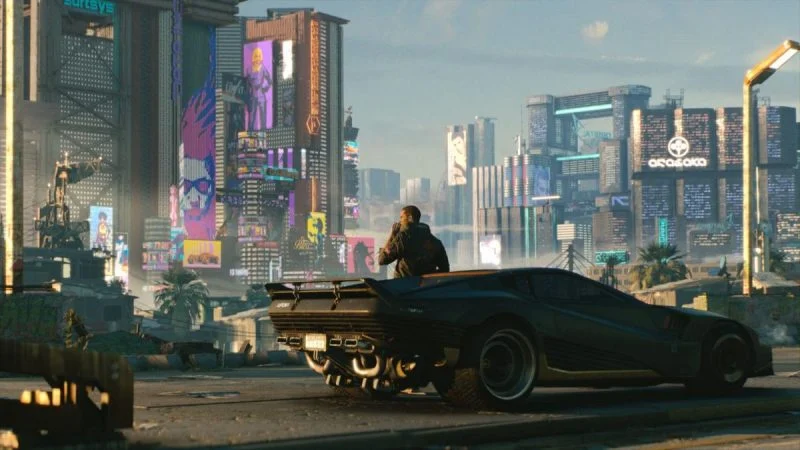Introduction to Cyberpunk 2077: Initial Expectations vs. Reality
Cyberpunk 2077, developed by CD Projekt Red, was one of the most anticipated video games in recent history. The excitement surrounding its release generated significant marketing buzz, promising players an immersive world filled with engaging narratives, state-of-the-art graphics, and expansive gameplay opportunities. This vibrant portrayal of a dystopian future captivated gamers, leading to soaring pre-order numbers and heightened expectations. The promotional campaigns painted a picture of a groundbreaking experience, which, according to the developers, would redefine the role-playing genre and elevate the standards of open-world games.
However, upon its release in December 2020, Cyberpunk 2077 fell short of these lofty expectations, leading to widespread backlash and disappointment among the player community. Many players encountered numerous bugs, crashes, and performance issues, which marred their overall experience. The game, specifically on older console generations, struggled to run smoothly, resulting in a frustrating experience that was far removed from what had been promised. Reviews from critics and users alike highlighted these concerns, with many noting that the game appeared unfinished, and its performance issues overshadowed the intriguing narrative and visually stunning environments that initially excited players.
This disparity between initial expectations and the reality experienced at launch led to a significant narrative shift within the gaming community. Players voiced their dissatisfaction extensively on social media and gaming forums, questioning the credibility of CD Projekt Red and its ability to deliver on promises. As patches and updates began to roll out, discussions shifted, focusing on whether the game could redeem itself and become the experience players originally hoped for. The unfolding situation highlighted the crucial impact of marketing and the responsibilities of developers in the gaming industry’s evolving landscape, ultimately shaping the perception of Cyberpunk 2077 and redefining player expectations for future titles.
The Journey of Patches: What Has Changed?
Since its launch in December 2020, Cyberpunk 2077 faced significant criticism due to a plethora of bugs, performance issues, and gameplay shortcomings. CD Projekt Red, the game’s developer, committed to remedying these concerns through a series of patches and updates aimed at enhancing the overall experience. By analyzing the trajectory of these patches, it becomes evident how the game has transformed considerably.
The major updates began rolling out shortly after the game’s release. Patch 1.1, released in January 2021, laid the foundation for future improvements. This patch prioritized stability and focused on fixing several crashing issues encountered by players. Furthermore, it introduced optimizations for memory usage, enabling the game to run more smoothly on various platforms.
Subsequent updates, such as Patch 1.2, released in March 2021, made substantial fixes to both gameplay mechanics and visual elements. Players saw improvements in the AI behavior of NPCs, as well as enhanced driving mechanics that contributed to a more immersive experience. Importantly, this patch also addressed numerous bugs, including issues that affected quest progression, which was a major point of frustration for many.
As patches progressed, the introduction of new features became apparent. For instance, Patch 1.5 marked a significant evolution in gameplay, incorporating mechanics that allowed for a more customized character experience and smoother interactions with the game world. Additionally, visual upgrades enhanced graphics, making Night City more vibrant and lifelike.
In recent months, updates have continued to reflect player feedback keenly, showcasing the developer’s commitment to creating a polished and engaging game. Combined, these patches have effectively addressed many of the community’s primary concerns, leading to improvements that have made Cyberpunk 2077 closer to the vision initially promised at launch.
Player Reception: The Impact of Updates on the Community
Since the launch of Cyberpunk 2077, the player community has seen a remarkable shift in sentiment, particularly following a series of patches aimed at addressing various issues. Prior to these updates, numerous players expressed frustration over bugs, crashes, and performance issues that tainted their gaming experience. Many took to social media platforms, voicing their dissatisfaction and disappointment in the game’s execution compared to the highly anticipated vision laid out during its marketing phase.
However, as patches have been rolled out—significantly the major updates that focused on stability and gameplay improvement—there has been a noticeable change in player feedback. Many gamers noted that the updates addressed several critical bugs that had plagued their playthroughs, allowing them to finally immerse themselves in the richly crafted world of Night City. Players have shared their experiences through gameplay streams and online reviews, showcasing a revitalized engagement with the game. The patch updates have not only diminished the severity of previous complaints but also enhanced features that contribute to a more enjoyable experience.
Social media reactions and gaming forums indicate a growing sense of community confidence in the developers’ commitment to rectifying earlier issues. For instance, players are now more inclined to recommend Cyberpunk 2077 to friends, taking to platforms like Reddit to discuss how the game is gradually aligning with its initial promises. This shifting perception is not just due to the patches themselves but also the transparent communication from the developers, who have actively engaged with the community by acknowledging issues and sharing progress on updates. Consequently, player trust, initially fractured at launch, is on a path to restoration, and engagement within the community appears to be rejuvenating, fostering a more positive narrative around the game.
Conclusion: Is Cyberpunk 2077 Finally Living Up to Its Promise?
As we reflect on the evolution of Cyberpunk 2077 post-patch, a nuanced perspective emerges regarding the game’s journey since its turbulent launch. Initially, the game was marketed as a groundbreaking role-playing experience set in a stunning open-world environment. However, the release was fraught with performance issues and unmet expectations, leading to widespread criticism and discontent among players and critics alike.
Since the deployment of numerous patches and updates, significant strides have been made in addressing the game’s technical shortcomings. The enhancements in graphics, gameplay mechanics, and quest design have improved overall stability and player immersion. Many players have reported a more seamless and engaging experience, complemented by enhanced AI behaviors and a visually striking environment that resonates well with the cyberpunk aesthetic.
Furthermore, the community’s feedback has prompted developers to refine various aspects of the game, illustrating a responsive development roadmap. From new content additions to the rework of existing gameplay elements, the developers have actively sought to realign Cyberpunk 2077 with its original vision. Critically, the introduction of features such as the new DLCs has reinvigorated interest in the game, though some argue that these late-stage improvements are indicative of the original release’s failure to meet expectations.
Overall, while ardent fans may argue that Cyberpunk 2077 has evolved substantially towards fulfilling its promised potential, others may remain skeptical, waiting for continued improvements before fully endorsing the game. As we look ahead, the game’s ongoing development will be pivotal in shaping its legacy, determining whether it can solidify its place as a towering achievement in the gaming industry or remain a cautionary tale of lofty ambitions. Players’ sentiments will play a crucial role in this ongoing narrative.


No responses yet